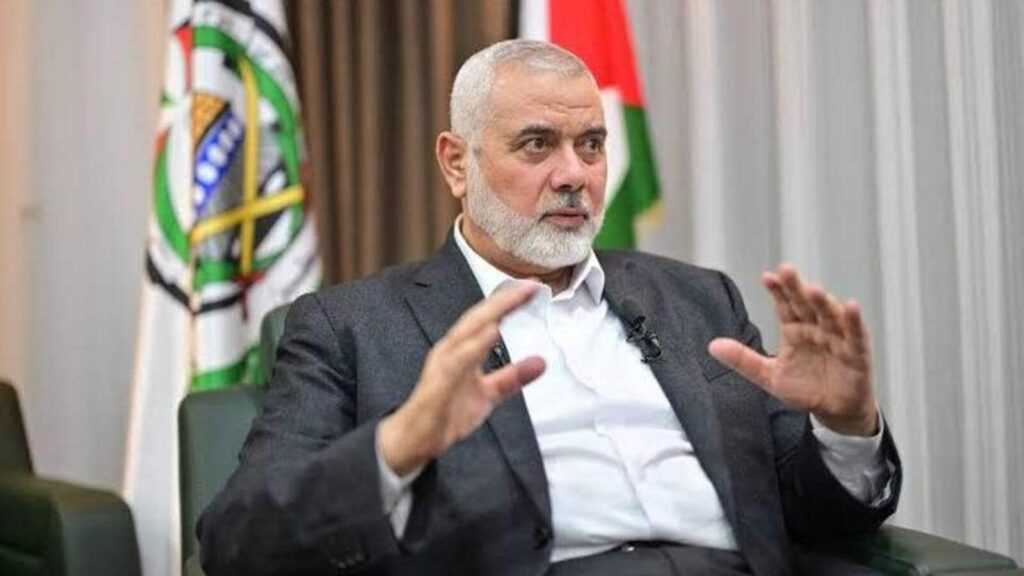
One of the world’s most divisive and complicated geopolitical topics is still the Israeli-Palestinian conflict. As a prominent leader of Hamas, Ismail Haniyeh was often at the center of this conflict, representing the political aspirations of many Palestinians. His death, resulting from a targeted strike attributed to Israeli forces, raises critical questions regarding principles of sovereignty, the rules of armed conflict, and the protections afforded to individuals under international law. This article explores whether the killing of Ismail Haniyeh constituted a violation of international law, analyzing relevant legal frameworks, historical precedents, and potential courses of action.
- Early Life and Background
Ismail Haniyeh was born in 1962 in the Al-Shāṭiʾ refugee camp in the Gaza Strip. He was the son of Palestinian Arab parents displaced from their village near Ashqelon in 1948. Educated in schools run by the United Nations Relief and Works Agency for Palestine Refugees in the Near East (UNRWA), Haniyeh later enrolled in the Islamic University of Gaza in 1981, where he studied Arabic literature and became active in student politics.
- Involvement in Hamas
In 1988, Haniyeh became one of the founding members of Hamas during the First Intifada (the term “intifada” is an Arabic word that translates to “uprising” or “rebellion”). He developed a close relationship with the group’s spiritual leader, Sheikh Ahmed Yassin. Haniyeh was arrested by Israeli authorities in 1988 for his activism and spent time in prison, ultimately being deported to Lebanon in 1992. He returned to Gaza in 1993 following the Oslo Accords and became the dean of the Islamic University.
- Prime Ministership
In 2006, Haniyeh led Hamas in the Palestinian legislative elections, where the group won a majority of seats. He was appointed Prime Minister of the Palestinian Authority (PA). His tenure was marked by international isolation and financial challenges, as many countries froze aid to the PA following Hamas’s victory. In June 2007, after conflicts with the rival Fatah party, President Mahmoud Abbas dismissed Haniyeh and dissolved his government, leading to a Hamas-led administration in Gaza.
- Leadership in Gaza
Haniyeh’s leadership in Gaza began in 2007, amid ongoing conflicts with Israel and the imposition of blockades. Under his administration, Hamas faced various challenges, including military confrontations with Israel. However, Haniyeh was seen as having secured significant concessions from Israel, including the release of Palestinian prisoners in exchange for captured Israeli soldier Gilad Shalit.
- Attempts at Reconciliation
Despite ongoing tensions with Fatah, there were several attempts at reconciliation. In 2014, Haniyeh’s government in Gaza resigned to pave the way for a unity government with Fatah, although he continued to lead Hamas locally. He later succeeded Khaled Meshaal as the chief of Hamas’s political bureau in 2017.
- Life Abroad and Political Activities
After stepping down from leadership in Gaza, Haniyeh moved to Turkey and Qatar to facilitate international representation for Hamas. He participated in significant events, including the funeral of Iranian General Qassem Soleimani and congratulated Taliban leader Abdul Ghani Baradar after the U.S. withdrawal from Afghanistan. In October 2022, he met with Syrian President Bashar al-Assad, marking a significant shift in Hamas’s foreign relations.
- Recent Developments and Death
During the Israel-Hamas War in 2024, Haniyeh led Hamas in cease-fire negotiations. Tragically, in April 2024, an Israeli strike killed three of his children and four grandchildren. The International Criminal Court announced plans to seek arrest warrants for Haniyeh and other leaders for war crimes. On July 31, 2024, Haniyeh was killed in a covert Israeli operation while visiting Tehran for the inauguration of Iranian President Masoud Pezeshkian.
Analyzing the Killing of Ismail Haniyeh: A Violation of International Law?
Haniyeh was assassinated by an airstrike on his guest house overnight when he was in Tehran for Iranian President Masoud Pezeshkian’s inauguration. Israel has not acknowledged nor denied culpability, despite Hamas blaming it. But since Hamas’ conflict with Israel began almost ten months ago, this is the most high-profile death of a Hamas official. The attack is largely believed to have been carried out by Israel. Tehran’s failure to protect the leader of an ally in its capital represents a serious security breach for the country.
Moreover, it is against international conventions to assassinate a political leader in a foreign nation. “All Members shall refrain in their international relations from the threat or use of force against the territorial integrity or political independence of any state,” states Article 2(4) of the UN Charter. By targeting Haniyeh on Iranian soil, the Israelis seem to have committed an act of aggression, setting a dangerous precedent. Such acts damage international legal frameworks, erode the integrity of international relations, and create a vicious cycle of tit-for-tat retaliation that has the potential to go out of control.
If the Israel did play a role in killing Haniyeh, it would be a significant violation of Iran’s sovereignty. If the allegations are true, Israel would be guilty of violating the basic rule that states are bound to respect each other’s’ territorial sovereignty. It would also violate the UN Charter that is quoted above as well, which says all members shall refrain “from the threat or use of force against the territorial integrity or political independence of any state.”
Legal Frameworks Governing Targeted Killings:
Here are key international laws that may be violated in the context of the killing of Ismail Haniyeh:
1. Geneva Conventions
Fourth Geneva Convention (1949): This treaty provides protection for civilians during times of war. Article 3 prohibits violence to life and person, particularly murder of all kinds, as well as cruel treatment and torture of individuals.
2. International Covenant on Civil and Political Rights (ICCPR)
Article 6: This article states that every human being has the inherent right to life, which must be protected by law. It emphasizes that no one shall be arbitrarily deprived of their life.
3. Customary International Humanitarian Law
Principle of Distinction: Under IHL, combatants must distinguish between military targets and civilians. Targeting individuals who are not engaged in active hostilities, especially political leaders like Haniyeh, can constitute a violation.
Principle of Proportionality: Even if a military target is identified, attacks must not cause excessive civilian harm relative to the anticipated military advantage.
4. Rome Statute of the International Criminal Court
Article 7(1)(a): This article defines murder as a crime against humanity when it is committed as part of a widespread or systematic attack directed against any civilian population.
Article 8(2)(b)(i): This clause specifically addresses serious violations of the laws and customs of war, including the intentional targeting of civilians or non-combatants.
5. United Nations Charter
Article 2(4): This article prohibits the threat or use of force against the territorial integrity or political independence of any state. The use of force must be justified under specific circumstances, such as self-defense.
6. International Law Commission’s Articles on State Responsibility
Article 1: This article establishes that every international wrongful act of a state entails the international responsibility of that state. If the killing is deemed unlawful, it may invoke state responsibility.
Possible Courses of Action
In response to the killing of Ismail Haniyeh, several courses of action could be pursued, both legally and diplomatically.
- International Investigations:
International bodies, such as the United Nations, could conduct investigations into the circumstances surrounding Haniyeh’s death. This could involve the establishment of a commission to ascertain whether the killing constitutes a violation of international law. Such investigations would be essential in establishing accountability and clarifying the legal implications of targeted killings in similar contexts.
- Legal Recourse
Affected states or organizations could pursue legal action through international courts, like the International Criminal Court (ICC). For instance, Canada and its allies recently brought Iran to the International Court of Justice (ICJ) over its role in the downing of a Ukrainian passenger jet, which resulted in the deaths of all 176 people on board in 2020. They could also file complaints against the individuals who organized Haniyeh’s killing, claiming it was a war crime or a crime against humanity. Although the ICC can handle cases involving war crimes and crimes against humanity, taking these cases to court can be complicated and politically sensitive.
- Diplomatic Measures
Diplomatic efforts could be made to address the broader implications of Haniyeh’s killing, advocating for a renewed focus on negotiations between conflicting parties. Calls for de-escalation and peace talks could be emphasized, highlighting the importance of addressing the root causes of the Israeli-Palestinian conflict. This could involve engaging regional actors and international stakeholders in mediating a resolution.
- Public Awareness and Advocacy
Human rights organizations and civil society could work to raise public awareness about the implications of Haniyeh’s killing. Advocacy campaigns highlighting the importance of adhering to international law and protecting human rights could mobilize public opinion and pressurize governments to take action. Additionally, these organizations could document instances of targeted killings and their consequences, contributing to the broader discourse on accountability and justice.
Historical Precedents of Targeted Killings
Targeted killings have emerged as a contentious issue in international law, raising ethical and legal questions. Various historical precedents highlight the complexities and justifications surrounding these actions.
One significant case is the assassination of Osama bin Laden in 2011. U.S. Navy SEALs killed bin Laden in a compound in Pakistan, with the U.S. government claiming that he posed an imminent threat. This operation was framed as an act of self-defense under international law. However, it raised concerns regarding sovereignty and the legality of conducting military operations in a foreign country without its consent.
Another high-profile targeted killing occurred in 2020 when the U.S. conducted a drone strike that killed Iranian General Qassem Soleimani in Iraq. The U.S. justified this action by asserting that Soleimani was involved in orchestrating attacks against U.S. forces and posed an immediate threat. This incident sparked debate over the legality of targeted killings and the implications for international relations.
Israel has also been involved in targeted killings, particularly against Palestinian militants. In 2023, Israel killed Fuad Shukr, a senior commander in Hamas, through an airstrike. Israel justified the action as necessary for national security, continuing its policy of targeting individuals it deems threats. Additionally, Israel is suspected of assassinating Iranian nuclear scientists to prevent the advancement of Iran’s nuclear program.
A historical precedent of a different nature is the 1960 kidnapping and execution of Adolf Eichmann, a key figure in orchestrating the Holocaust, by Israeli agents in Argentina. This action led to international condemnation and highlighted the legal ramifications of extrajudicial actions taken outside a nation’s borders.
In all these cases, the general consensus among states is that during armed conflicts, it is permissible to kill combatants or individuals directly involved in hostilities. However, human rights activists argue that targeted killings often lack due process, as the individuals involved are not given the opportunity to defend themselves in court. As one critic noted, “There’s been no process to judge before they execute,” raising significant concerns about the legality and morality of extrajudicial killings.
These historical precedents illustrate the ongoing debate surrounding targeted killings and their implications for international law, state sovereignty, and human rights. As conflicts evolve, the legal and ethical ramifications of such actions will continue to be scrutinized on the global stage.

